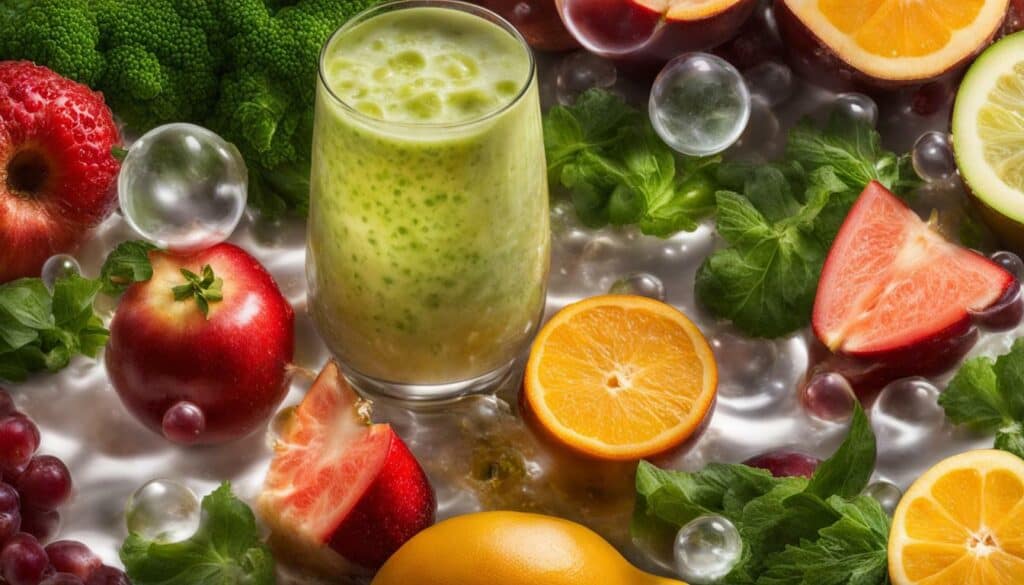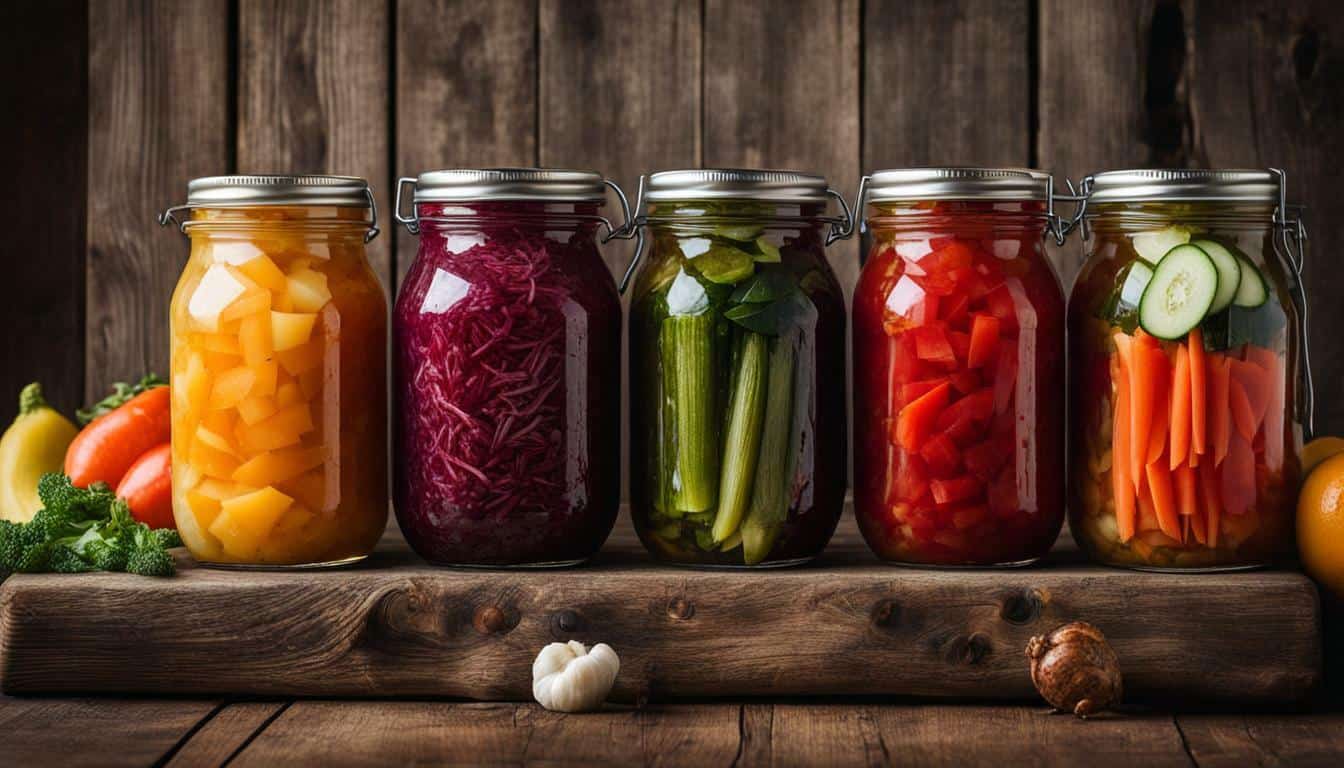Welcome to my guide on boosting your gut health with the power of fermented foods. Our gut plays a crucial role in our overall well-being, impacting digestion, nutrient absorption, and immune function. One of the key ways to promote a healthy gut is by incorporating fermented foods into our diet. These foods are not only delicious but also packed with probiotics, beneficial bacteria that support our gut health and offer a range of other health benefits.
- Fermented foods are rich in probiotics, which are beneficial bacteria that support gut health.
- Gut health is crucial for digestion, nutrient absorption, and protection against infections and illnesses.
- Incorporating fermented foods like sauerkraut, kimchi, kefir, kombucha, miso, tempeh, and sauerkraut into your diet can promote better gut health and overall wellness.
- Fermented foods offer a range of health benefits, including improved digestion, reduced inflammation, and enhanced immune function.
- It’s important to balance your diet, exercise regularly, manage stress, and consume probiotics to maintain a healthy gut.
Now that we understand the importance of gut health and the benefits of fermented foods, let’s explore some of the key fermented foods that can help boost your gut health.
Understanding Gut Health and its Impact on Overall Well-being
Before we dive into the world of fermented foods, let’s understand why gut health is so crucial for our overall well-being. Our gut, also known as the gastrointestinal tract, plays a vital role in our digestive system and has a significant impact on our immune system, mental health, and even skin condition. It is home to trillions of microorganisms, collectively known as the gut microbiome, which consists of both good and bad bacteria. The balance of these bacteria is essential for optimal gut health and overall wellness.
A healthy gut helps with the digestion and absorption of nutrients, ensuring that our body gets the essential vitamins, minerals, and energy it needs to function properly. It also produces important hormones and neurotransmitters, such as serotonin, which plays a key role in regulating mood and preventing mental health issues like anxiety and depression. Additionally, a strong gut microbiome acts as a barrier against harmful pathogens, reducing the risk of infections and illnesses.
One way to improve and maintain a healthy gut is by incorporating fermented foods into our diet. Fermentation is a process in which natural bacteria convert sugars and carbohydrates into beneficial compounds like probiotics. Probiotics are live bacteria that provide numerous health benefits when consumed. They help restore the balance of good and bad bacteria in the gut, improve digestion, reduce inflammation, strengthen the immune system, and enhance nutrient absorption.

Fermented foods are rich in probiotics and offer a wide range of gut-healing properties. Some popular examples include sauerkraut, kimchi, kefir, kombucha, miso, and tempeh. These foods not only provide beneficial bacteria but also contain vitamins, minerals, and antioxidants that further support overall health. By incorporating a variety of fermented foods into our daily meals, we can promote better gut health, improve digestion, and boost our overall wellness.
The Role of Probiotics in Fermentation
Fermented foods are not only delicious, but they also contain beneficial bacteria known as probiotics, which play a key role in promoting a healthy gut. During the fermentation process, microorganisms like bacteria and yeast break down sugars and convert them into compounds like lactic acid or alcohol. These compounds create an acidic environment that preserves the food and enhances its flavor and texture. At the same time, they promote the growth of good bacteria that are beneficial to our gut.
Probiotics are live microorganisms that, when consumed in adequate amounts, provide health benefits to the host. They can improve digestion, boost the immune system, reduce inflammation, and aid in nutrient absorption. Fermented foods are a rich source of probiotics, making them an excellent addition to any gut-friendly diet.
Some of the best-known fermented foods that are high in probiotics include sauerkraut, kimchi, kefir, kombucha, miso, tempeh, and yogurt. Incorporating these foods into your daily meals can help replenish and maintain the balance of good bacteria in your gut, supporting optimal gut health.

Furthermore, fermented foods offer additional health benefits beyond probiotics. For example, sauerkraut and kimchi are packed with fiber and vitamin C, which can support digestive health and boost the immune system. Kefir and kombucha are rich in antioxidants and may have anti-inflammatory properties. Miso and tempeh provide plant-based protein along with various vitamins and minerals.
To get the most out of fermented foods, it’s important to choose high-quality options and consume them regularly. Consider adding a variety of fermented foods to your diet to ensure a diverse range of probiotic strains. You can enjoy them as side dishes, condiments, snacks, or even incorporate them into your favorite recipes.
A Quick Guide to Gut-Friendly Fermented Foods:
| Fermented Food | Benefits |
|---|---|
| Sauerkraut | Rich in probiotics, fiber, and vitamin C; supports digestion and immune function. |
| Kimchi | Probiotic powerhouse with anti-inflammatory properties; aids digestion and boosts immunity. |
| Kefir | Probiotic-rich dairy drink packed with antioxidants; may have anti-inflammatory effects. |
| Kombucha | Refreshing fermented tea with probiotics and antioxidants; supports gut health and detoxification. |
| Miso | Flavorful Japanese fermented paste; provides probiotics, protein, and various nutrients. |
| Tempeh | Nutrient-dense fermented soy product; offers probiotics and plant-based protein. |
Remember, a healthy gut is essential for overall well-being. By incorporating probiotic-rich fermented foods into your diet, you can support your gut health and enjoy a variety of delicious flavors along the way.
Sauerkraut – The Classic Gut-Friendly Fermented Food
One of the most popular fermented foods for gut health is sauerkraut, a classic dish made from fermented cabbage. It has been enjoyed for centuries and is known for its tangy flavor and numerous health benefits. Sauerkraut is rich in probiotics, which are beneficial bacteria that help restore and maintain a healthy balance in the gut microbiome. These probiotics promote better digestion, improve nutrient absorption, and support a strong immune system.
Aside from being a probiotic powerhouse, sauerkraut offers other health advantages. It is a great source of vitamins C and K, as well as dietary fiber. These nutrients contribute to improved digestion and can help prevent constipation. Additionally, sauerkraut contains antioxidants that protect cells from damage caused by harmful free radicals.
Incorporating sauerkraut into your diet is easy. It can be enjoyed as a side dish, added to sandwiches or wraps for a tangy kick, or used as a topping for salads and bowls. Be mindful of the sodium content, as some store-bought sauerkrauts may be high in salt. Opt for homemade or low-sodium varieties whenever possible. Remember to introduce sauerkraut gradually into your diet to allow your body to adjust to the increase in probiotics.
Why Sauerkraut?
Sauerkraut’s fermentation process enhances its nutritional profile, making it a gut-friendly powerhouse. The fermentation of cabbage produces lactic acid, which not only gives sauerkraut its distinct sour taste but also promotes the growth of beneficial bacteria. These probiotics aid in maintaining a healthy gut environment and can help alleviate digestive issues such as bloating and gas.
When consuming sauerkraut, it’s important to choose high-quality, organic options whenever possible. The organic cabbage used in the fermentation process ensures that you’re not exposed to harmful pesticides or additives. Additionally, opting for raw sauerkraut, which has not been pasteurized, preserves the probiotic content and maximizes the potential health benefits.
| Benefits of Sauerkraut | Why They Matter |
|---|---|
| Probiotics | Promote a healthy gut microbiome and aid digestion |
| Vitamin C | Boosts the immune system and supports collagen production |
| Vitamin K | Essential for blood clotting and bone health |
| Fiber | Promotes regular bowel movements and aids in weight management |
| Antioxidants | Helps protect against cellular damage and inflammation |
By incorporating sauerkraut into your diet, you can enjoy a flavorful and nutritious addition that promotes gut health and overall well-being. Experiment with different recipes and discover the diverse ways sauerkraut can enhance your meals.

If you love spicy flavors and want to boost your gut health, kimchi is the perfect fermented food to try. This traditional Korean dish is not only packed with bold and tangy flavors, but it also offers numerous health benefits for your digestive system. Made from fermented vegetables like cabbage, radishes, and carrots, kimchi is brimming with beneficial bacteria that can improve the balance of your gut microbiome.
One of the key components of kimchi is lactobacillus, a probiotic strain that promotes gut health. These live bacteria help to break down food, enhance nutrient absorption, and support a healthy immune system. By incorporating kimchi into your diet, you can improve digestion, reduce inflammation, and enhance the overall function of your gut.
Kimchi can be enjoyed in various ways. You can eat it as a side dish, add it to salads, or use it as a flavorful ingredient in stir-fries and rice bowls. Its versatility allows you to experiment with different recipes and find the perfect combination that suits your taste buds.
To make your own kimchi at home, you’ll need a few simple ingredients like Napa cabbage, radishes, garlic, ginger, chili powder, and fish sauce. The fermentation process takes a few days, allowing the flavors to develop and the beneficial bacteria to thrive. Once ready, store your homemade kimchi in a jar in the refrigerator and enjoy it for weeks to come.

| Nutrient | Amount per Serving |
|---|---|
| Calories | 30 |
| Carbohydrates | 7g |
| Fiber | 2g |
| Protein | 2g |
| Fat | 0g |
| Vitamin C | 30% of DV |
| Vitamin K | 35% of DV |
Kimchi is low in calories and fat, making it a healthy addition to your meals. It is also a good source of fiber, which supports digestion and helps maintain a healthy weight. Additionally, kimchi is loaded with vitamins and minerals, including vitamin C and vitamin K, which are important for immune function and bone health.
So, if you’re looking to spice up your meals and improve your gut health, give kimchi a try. Its delicious flavors and probiotic benefits make it a standout choice among fermented foods for promoting a healthy digestive system.
Kefir – The Probiotic-rich Dairy Drink
Kefir, a fermented dairy drink, is not only delicious but also packed with probiotics that can benefit your gut health. It is made by fermenting milk with kefir grains, which are a combination of bacteria and yeast. The fermentation process breaks down lactose, making kefir easier to digest for those who are lactose intolerant. It also creates a variety of beneficial bacteria and yeasts that populate your gut, supporting a healthy microbiome.
One of the key benefits of kefir is its ability to improve digestion. The probiotics in kefir help break down food, making it easier for your body to absorb nutrients. This can alleviate digestive issues such as bloating, gas, and constipation. Kefir also contains enzymes that aid in the digestion of proteins and fats, further enhancing its digestive benefits.
In addition to supporting gut health, kefir has been associated with various other health benefits. It has been shown to reduce inflammation in the body, which is linked to a wide range of chronic diseases. Kefir can also boost immune function, as the probiotics help stimulate the production of antibodies and enhance the activity of immune cells. Moreover, kefir is a good source of calcium, protein, and vitamins, making it a nutritious addition to your diet.

| Health Benefits of Kefir |
|---|
| Improved digestion and nutrient absorption |
| Reduced inflammation in the body |
| Enhanced immune function |
| Good source of calcium, protein, and vitamins |
There are numerous ways to enjoy kefir. You can drink it on its own, use it as a base for smoothies, or incorporate it into recipes like salad dressings, pancakes, or overnight oats. It has a tangy flavor that adds a delightful touch to both sweet and savory dishes. To get the most out of kefir, it is recommended to choose organic, full-fat options that have been fermented for a longer period.
Incorporating Kefir into Your Diet
- Drink a glass of kefir as a snack or part of your breakfast.
- Add kefir to your favorite smoothie recipes for a creamy and probiotic-rich boost.
- Use kefir as a base for homemade salad dressings to add tanginess and gut-friendly bacteria.
- Replace regular milk or yogurt with kefir in recipes for pancakes, muffins, or bread.
- Enjoy kefir over fruit or granola for a refreshing and nutritious dessert.
By incorporating kefir into your diet, you can improve your gut health and enjoy the many benefits that probiotics have to offer. Experiment with different flavors and recipes to find the ones that suit your taste buds best. Cheers to a healthier gut with a delicious glass of kefir!
Kombucha – The Refreshing Fermented Tea
If you’re looking for a tasty and gut-friendly alternative to sugary sodas, try kombucha, a fermented tea with a slight fizz. This invigorating beverage has been celebrated for its probiotic content and potential health benefits. Made by fermenting sweetened tea with a colony of bacteria and yeast, kombucha is not only refreshing but also supportive of a healthy gut.
One of the key components of kombucha is its probiotic content. Probiotics are beneficial bacteria that can help restore and maintain a healthy balance in the gut microbiome. These live cultures aid in digestion, support immune function, and promote overall well-being. By consuming kombucha regularly, you can introduce these probiotics into your system and contribute to a healthier gut.
In addition to its probiotic properties, kombucha offers a variety of flavors to suit different palates. From fruity to tangy to slightly tart, there’s a kombucha flavor for every taste preference. Whether you enjoy it on its own or mixed with other ingredients, kombucha can be a versatile addition to your daily routine.
Try this Refreshing Kombucha Mocktail: Blueberry Lemonade
- Ingredients:
- 1 cup blueberries
- 1 cup lemonade
- 1 cup kombucha (preferably blueberry-flavored)
- Instructions:
- Blend the blueberries until smooth.
- In a glass, combine the blueberry puree, lemonade, and kombucha.
- Stir well and serve over ice.
In conclusion, incorporating kombucha into your diet can be a delightful way to improve your gut health. Its probiotic content, refreshing taste, and versatility make it an excellent choice for those seeking a gut-friendly beverage. So, why not give it a try and experience the wonders of kombucha for yourself?

| Kombucha Benefits | Description |
|---|---|
| Rich in Probiotics | Kombucha contains live cultures of beneficial bacteria that can support gut health. |
| Detoxification | The fermentation process of kombucha produces organic acids that may aid in detoxifying the body. |
| Improved Digestion | Drinking kombucha can potentially improve digestion, reduce bloating, and alleviate gastrointestinal issues. |
| Antioxidant Properties | Kombucha contains antioxidants that help combat free radicals and oxidative stress in the body. |
Miso – The Flavorful Japanese Fermented Paste
Miso, a traditional Japanese fermented paste made from soybeans, is not only packed with flavor but also provides gut-healing benefits. With its umami taste and rich texture, it adds depth to a variety of dishes, making it a versatile ingredient in fermented food recipes.
One of the key components of miso is probiotics, which are live bacteria that promote a healthy balance of gut flora. These beneficial bacteria help improve digestion, strengthen the immune system, and reduce inflammation in the gut. Additionally, miso contains enzymes that aid in the breakdown of proteins and enhance nutrient absorption.
There are different types of miso, ranging from light and sweet to dark and bold in flavor. The fermentation process of miso can vary, resulting in variations in taste and texture. Some popular types of miso include white miso, red miso, and barley miso.
How to Use Miso in Your Cooking
There are numerous ways to incorporate miso into your diet. You can use it as a base for soups, marinades, dressings, and sauces. It pairs well with vegetables, tofu, seafood, and meats, adding depth and complexity to your dishes. A simple and delicious way to enjoy miso is by making miso soup, a staple in Japanese cuisine.
Here is a simple miso soup recipe to get you started:
| Ingredients | Instructions |
|---|---|
| 4 cups of vegetable broth | 1. Heat the vegetable broth in a pot. |
| 3 tablespoons of miso paste | 2. In a small bowl, dissolve the miso paste in a ladleful of hot broth. |
| 2 green onions, sliced | 3. Add the miso mixture and green onions to the pot. Simmer for a couple of minutes. |
| Tofu, cubed | 4. Optional: Add tofu or any other desired ingredients such as seaweed or mushrooms. |
| Fresh cilantro, chopped (for garnish) | 5. Serve hot and garnish with fresh cilantro. |

By incorporating miso into your diet, you can benefit from its gut-healing properties and enhance the overall health of your digestive system. Experiment with different types of miso and explore the various ways you can use this flavorful Japanese fermented paste in your cooking.
Tempeh – The Nutrient-dense Fermented Soy Product
Looking for a gut-friendly plant-based protein option? Look no further than tempeh, a nutrient-dense fermented soy product. Tempeh has gained popularity among health-conscious individuals due to its numerous health benefits and versatility in cooking. It is made by fermenting soybeans with the help of a specific type of fungus called Rhizopus oligosporus. This fermentation process not only enhances the protein content of soybeans but also improves their digestibility and nutrient absorption.
Tempeh is a great source of plant-based protein, making it an excellent choice for vegetarians and vegans. It contains all nine essential amino acids, making it a complete protein. In addition to protein, tempeh is also rich in fiber, vitamins, and minerals. It is a good source of iron, calcium, magnesium, and phosphorus. These nutrients are essential for maintaining optimal health and supporting various bodily functions.
One of the key benefits of consuming tempeh is its positive impact on gut health. As a fermented food, tempeh is packed with beneficial bacteria, known as probiotics, which promote a healthy balance of gut flora. These probiotics contribute to improved digestion, enhanced nutrient absorption, and a strengthened immune system. The fermentation process also breaks down antinutrients present in soybeans, making the nutrients more bioavailable and easier to digest.

There are numerous ways to incorporate tempeh into your diet. You can marinate and grill it, stir-fry it with vegetables, crumble it into sauces or stews, or even use it as a meat substitute in burgers or tacos. Its nutty flavor and firm texture make it a versatile ingredient that can be enjoyed in a variety of dishes. Experiment with different spices and marinades to enhance the taste and create unique flavor combinations.
When purchasing tempeh, opt for organic and non-GMO varieties whenever possible to ensure the highest quality and avoid unnecessary additives. It is also important to note that tempeh is a soy-based product, so individuals with soy allergies or sensitivities should consult with a healthcare professional before adding it to their diet. With its high nutrient content and gut-boosting properties, tempeh is definitely a fermented food worth considering for better gut health and overall well-being.
Other Fermented Foods to Consider for Gut Health
In addition to the popular fermented foods we’ve discussed, there are other options that can contribute to a healthy digestive system. These foods are not only delicious but also provide a wide range of nutrients and probiotics that support gut health.
One such option is yogurt, which is made from fermented milk. It contains live cultures that help balance the gut microbiome and promote healthy digestion. Yogurt is also rich in calcium and protein, making it a nutritious addition to your diet.
Pickles, another fermented food, are cucumbers that have been soaked in a brine solution. They are low in calories and high in antioxidants, and they can help improve digestion due to their probiotic content. Pickles are a tasty and refreshing snack that can be enjoyed on their own or added to salads and sandwiches.
Sourdough bread is another fermented food that can benefit your gut health. It is made with a starter culture of wild yeast and lactic acid bacteria, which help break down gluten and other hard-to-digest proteins. This process not only makes sourdough bread easier to digest but also increases the bioavailability of nutrients.
| Fermented Food | Health Benefits |
|---|---|
| Yogurt | Contains probiotics that support gut health. High in calcium and protein. |
| Pickles | Low in calories, high in antioxidants. Improves digestion due to probiotic content. |
| Sourdough Bread | Easier to digest and increases the bioavailability of nutrients. |
Adding these fermented foods to your diet can provide you with a variety of flavors and textures while boosting your gut health. Experiment with different options and find what works best for you. Remember to choose high-quality, organic products whenever possible to ensure maximum benefits.

Now that you’re familiar with a variety of gut-friendly fermented foods, let’s explore how you can easily incorporate them into your diet. Adding fermented foods to your daily meals is a simple and delicious way to support your gut health and overall well-being. Here are some tips to get you started:
1. Start with Small Portions
If you’re new to fermented foods, it’s best to introduce them gradually. Begin with small portions to allow your body to adjust to the beneficial bacteria. For example, you can start by adding a spoonful of sauerkraut or a few tablespoons of kefir to your meals. As your body becomes more accustomed to fermented foods, you can increase the serving sizes.
2. Get Creative with Recipes
There are endless possibilities when it comes to incorporating fermented foods into your recipes. Experiment with different flavors and textures to find combinations you enjoy. For instance, try adding kimchi to stir-fries or tacos for a spicy kick, or include miso in your salad dressings for an umami flavor. You can also use kefir as a base for smoothies or enjoy kombucha as a refreshing beverage.
3. Use Fermented Foods as Condiments
Fermented foods make excellent condiments that can enhance the flavors of your dishes. Use sauerkraut as a topping for sandwiches or hot dogs, or add a dollop of yogurt to your soups or curries. These small additions can provide a burst of flavor while also promoting good gut health.
| Fermented Food | Usage |
|---|---|
| Sauerkraut | As a topping for sandwiches or hot dogs |
| Kimchi | In stir-fries, tacos, or as a side dish |
| Kefir | As a base for smoothies or as a yogurt substitute |
| Kombucha | As a refreshing beverage or mixer |
| Miso | In salad dressings or marinades |
| Tempeh | As a meat substitute in various dishes |
By incorporating fermented foods into your diet, you can enjoy their flavorful and nutritious benefits while nurturing your gut health. Remember to listen to your body and choose the fermented foods that suit your preferences and dietary needs. Embrace the versatility of these gut-friendly foods and have fun exploring new tastes and textures!

By including fermented foods in your diet, you can improve your gut health and experience the numerous benefits they offer. The balance of good and bad bacteria in the gut microbiome is essential for digestion, absorption of nutrients, and protection against infections and illnesses. A healthy gut can be achieved through a balanced diet, exercise, stress reduction, and the consumption of probiotics.
Probiotics can be found in fermented foods, which are rich in beneficial bacteria. These include sauerkraut, kimchi, kefir, kombucha, miso, tempeh, and sauerkraut. These foods not only provide probiotics but also offer other health benefits such as improved digestion, reduced inflammation, and enhanced immune function.
Incorporating fermented foods into the diet can promote better gut health and overall wellness. With their natural probiotic content, these foods help to restore the balance of bacteria in the gut, supporting healthy digestion and absorption of nutrients. They can also boost the immune system, reduce bloating and discomfort, and even improve mental health.
So, why not start adding fermented foods to your daily meals? Whether it’s enjoying a serving of sauerkraut with your sandwich, sipping on a glass of refreshing kombucha, or experimenting with different fermented vegetable dishes, your gut will thank you for it. Take care of your gut, and it will take care of you!
Can Eating Fermented Foods Help Improve Digestion of Biscuits?
Eating fermented foods alongside biscuits might aid in the digestion process, especially considering the carb content in biscuits. The beneficial bacteria present in fermented foods can assist in breaking down complex carbohydrates, potentially leading to better digestion of the carbs found in biscuits.

| Kombucha Benefits | Description |
|---|---|
| Rich in Probiotics | Kombucha contains live cultures of beneficial bacteria that can support gut health. |
| Detoxification | The fermentation process of kombucha produces organic acids that may aid in detoxifying the body. |
| Improved Digestion | Drinking kombucha can potentially improve digestion, reduce bloating, and alleviate gastrointestinal issues. |
| Antioxidant Properties | Kombucha contains antioxidants that help combat free radicals and oxidative stress in the body. |
Miso – The Flavorful Japanese Fermented Paste
Miso, a traditional Japanese fermented paste made from soybeans, is not only packed with flavor but also provides gut-healing benefits. With its umami taste and rich texture, it adds depth to a variety of dishes, making it a versatile ingredient in fermented food recipes.
One of the key components of miso is probiotics, which are live bacteria that promote a healthy balance of gut flora. These beneficial bacteria help improve digestion, strengthen the immune system, and reduce inflammation in the gut. Additionally, miso contains enzymes that aid in the breakdown of proteins and enhance nutrient absorption.
There are different types of miso, ranging from light and sweet to dark and bold in flavor. The fermentation process of miso can vary, resulting in variations in taste and texture. Some popular types of miso include white miso, red miso, and barley miso.
How to Use Miso in Your Cooking
There are numerous ways to incorporate miso into your diet. You can use it as a base for soups, marinades, dressings, and sauces. It pairs well with vegetables, tofu, seafood, and meats, adding depth and complexity to your dishes. A simple and delicious way to enjoy miso is by making miso soup, a staple in Japanese cuisine.
Here is a simple miso soup recipe to get you started:
| Ingredients | Instructions |
|---|---|
| 4 cups of vegetable broth | 1. Heat the vegetable broth in a pot. |
| 3 tablespoons of miso paste | 2. In a small bowl, dissolve the miso paste in a ladleful of hot broth. |
| 2 green onions, sliced | 3. Add the miso mixture and green onions to the pot. Simmer for a couple of minutes. |
| Tofu, cubed | 4. Optional: Add tofu or any other desired ingredients such as seaweed or mushrooms. |
| Fresh cilantro, chopped (for garnish) | 5. Serve hot and garnish with fresh cilantro. |

By incorporating miso into your diet, you can benefit from its gut-healing properties and enhance the overall health of your digestive system. Experiment with different types of miso and explore the various ways you can use this flavorful Japanese fermented paste in your cooking.
Tempeh – The Nutrient-dense Fermented Soy Product
Looking for a gut-friendly plant-based protein option? Look no further than tempeh, a nutrient-dense fermented soy product. Tempeh has gained popularity among health-conscious individuals due to its numerous health benefits and versatility in cooking. It is made by fermenting soybeans with the help of a specific type of fungus called Rhizopus oligosporus. This fermentation process not only enhances the protein content of soybeans but also improves their digestibility and nutrient absorption.
Tempeh is a great source of plant-based protein, making it an excellent choice for vegetarians and vegans. It contains all nine essential amino acids, making it a complete protein. In addition to protein, tempeh is also rich in fiber, vitamins, and minerals. It is a good source of iron, calcium, magnesium, and phosphorus. These nutrients are essential for maintaining optimal health and supporting various bodily functions.
One of the key benefits of consuming tempeh is its positive impact on gut health. As a fermented food, tempeh is packed with beneficial bacteria, known as probiotics, which promote a healthy balance of gut flora. These probiotics contribute to improved digestion, enhanced nutrient absorption, and a strengthened immune system. The fermentation process also breaks down antinutrients present in soybeans, making the nutrients more bioavailable and easier to digest.

There are numerous ways to incorporate tempeh into your diet. You can marinate and grill it, stir-fry it with vegetables, crumble it into sauces or stews, or even use it as a meat substitute in burgers or tacos. Its nutty flavor and firm texture make it a versatile ingredient that can be enjoyed in a variety of dishes. Experiment with different spices and marinades to enhance the taste and create unique flavor combinations.
When purchasing tempeh, opt for organic and non-GMO varieties whenever possible to ensure the highest quality and avoid unnecessary additives. It is also important to note that tempeh is a soy-based product, so individuals with soy allergies or sensitivities should consult with a healthcare professional before adding it to their diet. With its high nutrient content and gut-boosting properties, tempeh is definitely a fermented food worth considering for better gut health and overall well-being.
Other Fermented Foods to Consider for Gut Health
In addition to the popular fermented foods we’ve discussed, there are other options that can contribute to a healthy digestive system. These foods are not only delicious but also provide a wide range of nutrients and probiotics that support gut health.
One such option is yogurt, which is made from fermented milk. It contains live cultures that help balance the gut microbiome and promote healthy digestion. Yogurt is also rich in calcium and protein, making it a nutritious addition to your diet.
Pickles, another fermented food, are cucumbers that have been soaked in a brine solution. They are low in calories and high in antioxidants, and they can help improve digestion due to their probiotic content. Pickles are a tasty and refreshing snack that can be enjoyed on their own or added to salads and sandwiches.
Sourdough bread is another fermented food that can benefit your gut health. It is made with a starter culture of wild yeast and lactic acid bacteria, which help break down gluten and other hard-to-digest proteins. This process not only makes sourdough bread easier to digest but also increases the bioavailability of nutrients.
| Fermented Food | Health Benefits |
|---|---|
| Yogurt | Contains probiotics that support gut health. High in calcium and protein. |
| Pickles | Low in calories, high in antioxidants. Improves digestion due to probiotic content. |
| Sourdough Bread | Easier to digest and increases the bioavailability of nutrients. |
Adding these fermented foods to your diet can provide you with a variety of flavors and textures while boosting your gut health. Experiment with different options and find what works best for you. Remember to choose high-quality, organic products whenever possible to ensure maximum benefits.

Now that you’re familiar with a variety of gut-friendly fermented foods, let’s explore how you can easily incorporate them into your diet. Adding fermented foods to your daily meals is a simple and delicious way to support your gut health and overall well-being. Here are some tips to get you started:
1. Start with Small Portions
If you’re new to fermented foods, it’s best to introduce them gradually. Begin with small portions to allow your body to adjust to the beneficial bacteria. For example, you can start by adding a spoonful of sauerkraut or a few tablespoons of kefir to your meals. As your body becomes more accustomed to fermented foods, you can increase the serving sizes.
2. Get Creative with Recipes
There are endless possibilities when it comes to incorporating fermented foods into your recipes. Experiment with different flavors and textures to find combinations you enjoy. For instance, try adding kimchi to stir-fries or tacos for a spicy kick, or include miso in your salad dressings for an umami flavor. You can also use kefir as a base for smoothies or enjoy kombucha as a refreshing beverage.
3. Use Fermented Foods as Condiments
Fermented foods make excellent condiments that can enhance the flavors of your dishes. Use sauerkraut as a topping for sandwiches or hot dogs, or add a dollop of yogurt to your soups or curries. These small additions can provide a burst of flavor while also promoting good gut health.
| Fermented Food | Usage |
|---|---|
| Sauerkraut | As a topping for sandwiches or hot dogs |
| Kimchi | In stir-fries, tacos, or as a side dish |
| Kefir | As a base for smoothies or as a yogurt substitute |
| Kombucha | As a refreshing beverage or mixer |
| Miso | In salad dressings or marinades |
| Tempeh | As a meat substitute in various dishes |
By incorporating fermented foods into your diet, you can enjoy their flavorful and nutritious benefits while nurturing your gut health. Remember to listen to your body and choose the fermented foods that suit your preferences and dietary needs. Embrace the versatility of these gut-friendly foods and have fun exploring new tastes and textures!

By including fermented foods in your diet, you can improve your gut health and experience the numerous benefits they offer. The balance of good and bad bacteria in the gut microbiome is essential for digestion, absorption of nutrients, and protection against infections and illnesses. A healthy gut can be achieved through a balanced diet, exercise, stress reduction, and the consumption of probiotics.
Probiotics can be found in fermented foods, which are rich in beneficial bacteria. These include sauerkraut, kimchi, kefir, kombucha, miso, tempeh, and sauerkraut. These foods not only provide probiotics but also offer other health benefits such as improved digestion, reduced inflammation, and enhanced immune function.
Incorporating fermented foods into the diet can promote better gut health and overall wellness. With their natural probiotic content, these foods help to restore the balance of bacteria in the gut, supporting healthy digestion and absorption of nutrients. They can also boost the immune system, reduce bloating and discomfort, and even improve mental health.
So, why not start adding fermented foods to your daily meals? Whether it’s enjoying a serving of sauerkraut with your sandwich, sipping on a glass of refreshing kombucha, or experimenting with different fermented vegetable dishes, your gut will thank you for it. Take care of your gut, and it will take care of you!
FAQ
Q: Why is gut health important?
A: Gut health is crucial for overall well-being as it affects digestion, nutrient absorption, and protection against infections and illnesses.
Q: How can fermented foods improve gut health?
A: Fermented foods, rich in beneficial bacteria known as probiotics, can help restore the balance of good and bad bacteria in the gut, promoting better digestion and overall gut health.
Q: What are some examples of fermented foods?
A: Some examples of fermented foods include sauerkraut, kimchi, kefir, kombucha, miso, tempeh, and sourdough bread.
Q: What are the benefits of fermented foods?
A: Fermented foods not only provide probiotics but also offer other health benefits such as improved digestion, reduced inflammation, and enhanced immune function.
Q: How can I incorporate fermented foods into my diet?
A: You can incorporate fermented foods into your diet by adding them as toppings or ingredients in meals, enjoying them as snacks, or including them in your favorite recipes.
Q: Can fermented foods be enjoyed by people with lactose intolerance?
A: Yes, there are lactose-free options like lactose-free kefir or non-dairy fermented foods like sauerkraut and kimchi that can be safely consumed by individuals with lactose intolerance.
Q: Are there any side effects of consuming fermented foods?
A: While fermented foods are generally safe to consume, some individuals may experience temporary digestive discomfort or gas due to the introduction of new bacteria into their gut. It is best to start with small portions and gradually increase consumption.
Q: Can I make fermented foods at home?
A: Yes, many fermented foods can be made at home. However, it is important to follow proper fermentation techniques and hygiene practices to ensure food safety.
Q: How long does it take to see the effects of fermented foods on gut health?
A: The effects of fermented foods on gut health may vary from person to person. Some individuals may see improvements within a few weeks, while others may take longer. Consistency is key, so it is recommended to incorporate fermented foods into your diet regularly.
Q: Can I consume too much fermented foods?
A: While fermented foods are beneficial for gut health, it is important to consume them in moderation as part of a balanced diet. Excessive consumption may lead to an imbalance in gut bacteria or other digestive issues.





Leave a Reply